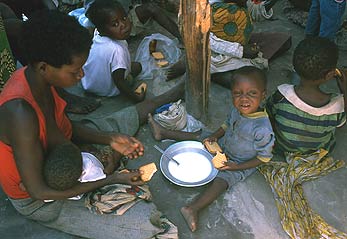Angola signs repatriation agreements with UNHCR, Namibia and Zambia
Angola signs repatriation agreements with UNHCR, Namibia and Zambia

LUANDA, Angola, November 28 (UNHCR) - Angola and the UN refugee agency today signed separate agreements with Namibia and Zambia under a programme for the voluntary return of 450,000 Angolan refugees in southern Africa.
Following the signing of the tripartite agreements in the Angolan capital of Luanda, commissions were set up to implement the repatriation programme for 211,000 Angolan refugees in Zambia and 24,000 in Namibia.
Similar agreements will be signed this year for the return of 193,000 Angolans in the Democratic Republic of the Congo (DRC), 16,000 from the Republic of Congo and 10,000 from South Africa. An estimated 50,000 Angolan refugees are living outside Africa.
Thursday's agreements provide the legal framework for voluntary repatriation and include provisions for tax waiver, amnesty, go-and-see visits to home villages, transport, accommodation, family reunification and reintegration.
UNHCR expects to organise the first repatriations at the end of the rainy season in May or June next year. Around 170,000 Angolans are anticipated to return with the refugee agency in 2003, for which an appeal for $34.5 million has been issued.
The Angolans constitute one of the world's longest-running refugee caseloads. UNHCR had attempted to begin repatriation from the DRC (formerly Zaire), Zambia and Namibia but the projects were put off when cease-fires in 1992 and 1995 collapsed. Some 70,000 Angolans were reported to have returned to Angola spontaneously since a peace agreement between the Angolan government and the UNITA (National Union for the Total Independence of Angola) rebels in April this year.
UNHCR hopes that the current peace accord will last and that the Angolans will finally be able to rebuild their lives after decades of conflict.
In another development, 40 Congolese refugees demanding resettlement in Europe and the United States lifted a three-month protest outside the UNHCR office in Luanda on Thursday. The UN Special Representative to Angola, Ibrahim Gambari, sought high-level assistance from the government to put an end to the protest that had disrupted the refugee agency's office work.








